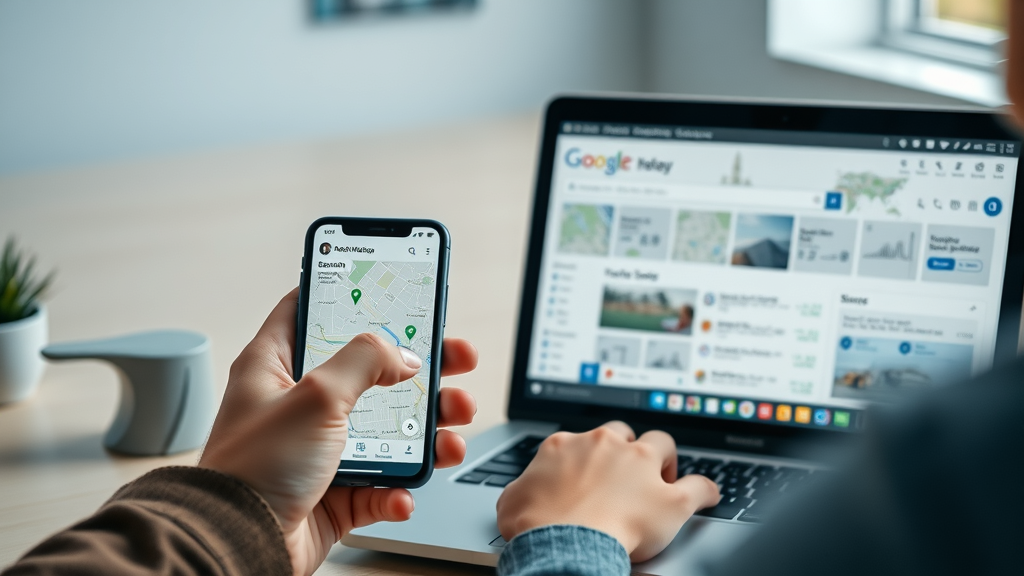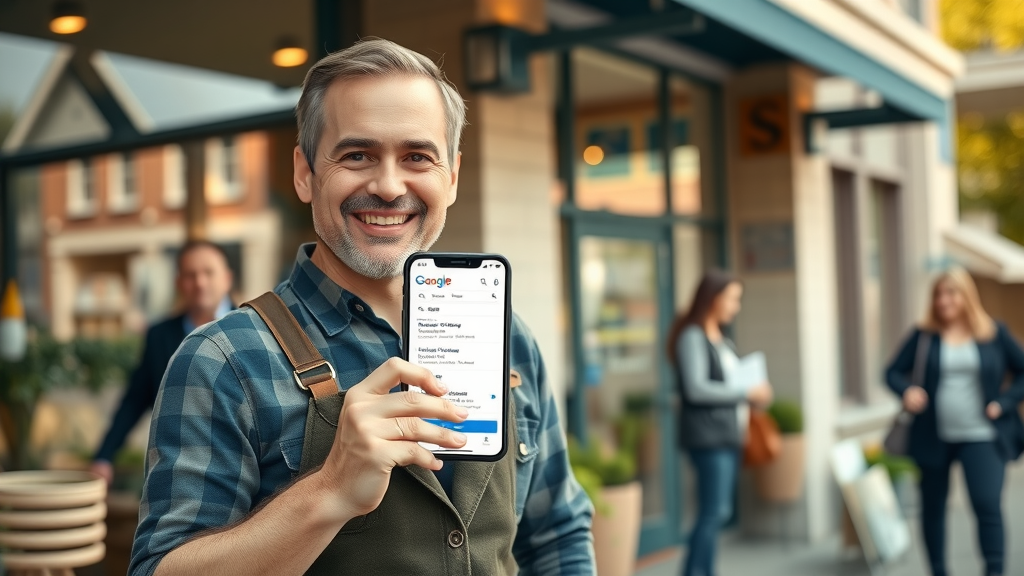Have you ever wondered why some local businesses are always packed while others remain empty? The answer increasingly lies in their mastery of mobile local search . With more people than ever searching for services and stores directly from their smartphones, the difference between being found and being overlooked has never been starker. In today’s fast-moving, on-the-go world, capturing your next customer could come down to where your business appears in local search results—and how well you connect with mobile users. This article will reveal exactly what’s changing, why it matters, and how you can ride the wave of mobile local search for real-world success.
Why Mobile Local Search Is Transforming Local SEO and Local Search
Mobile local search is disrupting traditional shopping behaviors, making it critical for businesses aiming to thrive in their neighborhoods and beyond. With the majority of users now relying on mobile devices to find local businesses, restaurants, and services, the impact on local SEO strategies is profound. In fact, today’s consumers expect immediate access to results tailored to their precise location, whether they’re searching for a nearby coffee shop or a trusted mechanic. As a result, search engines have evolved their algorithms and display preferences to serve mobile users with relevant, hyperlocal results that drive real customer connections.
The bottom line is clear: businesses that ignore mobile local search risk falling behind in rankings—and in customer traffic. Local businesses that optimize for mobile see a direct correlation with increases in foot traffic and conversions. Whether it’s through finely tuned local listings or digital techniques like voice-enabled commands, the landscape is shifting in favor of those ready to embrace a mobile-first mentality. To thrive, it’s no longer enough to be found online—you must be found first, right when the customer is ready to act.
“Did you know nearly 78% of mobile local searches result in an offline purchase? Mobile local search is no longer optional—it’s a business imperative.”

What You Need to Know About Mobile Local Search
-
The core concept of mobile local search and its influence on local SEO
-
Critical strategies to stand out in local searches
-
How local businesses can dominate mobile search engine rankings
-
Actionable digital marketing techniques tailored for small business success
Understanding the mechanics behind mobile local search is vital if you intend to leverage its power effectively. At its core, mobile local search connects users with businesses based on proximity, intent, and immediate need, redefining what it means to engage with customers online. It affects everything from your Google My Business presence to the way you optimize your website for smartphones. With tailored strategies that fuse location-centric content marketing, optimized local listings, and fast-loading, mobile-friendly designs, even small businesses can claim top spots in mobile local search results.
Beyond the basics, standing out in local search requires you to continually refine your approach. Whether incorporating hyperlocal keywords, earning positive reviews, or engaging users through Google Maps and voice search, a multi-pronged approach ensures you meet customers where they are—often, right around the corner. For those eager to get ahead, actionable digital marketing techniques and a commitment to ongoing optimization are the keys to long-term visibility and growth.
Understanding the Mechanics of Mobile Local Search in Local SEO
The shift from desktop to mobile has radically altered how users interact with search engines . Mobile users tend to search with greater urgency and specificity, seeking immediate solutions—be it directions, reviews, or contact details. These search queries are often driven by real-world needs and stronger intent to visit or purchase, making mobile local search a conversion powerhouse. Unlike desktop searches, which might center on research, mobile searches demand answers now, on the go.
To emphasize this difference, let’s compare the two platforms:
|
|
|
Comparison of Desktop vs. Mobile Local Search Features and User Intents |
|
Feature |
Desktop Local Search |
Mobile Local Search |
|---|---|---|
|
Primary Device |
Computer/laptop |
Smartphone/tablet |
|
User Intent |
Research, planning |
Action, immediate need |
|
Location Services |
Limited/geolocated by IP |
Precise GPS location |
|
Features |
Comprehensive SERP, maps embedded |
One-tap navigation, click-to-call, voice search |
|
Conversion Rate |
Lower |
Higher—often immediate |

The Impact of Google Search and Voice Search on Mobile Local Search
Not only have Google search algorithms grown increasingly sophisticated, but mobile-driven innovations like voice search are now fundamental to the customer journey. Today, users rely on seamless interactions—whether it’s by typing “best pizza near me” or simply asking their device for recommendations. For businesses, this means that Google My Business optimization is more important than ever.
-
Strategies for Google My Business optimization
-
Emergence of voice search in local business discovery
Local businesses need a proactive approach to capitalize on Google’s visibility algorithms. This includes ensuring accurate and complete business profiles, active review management, and the integration of voice-friendly keywords—queries structured in natural, conversational language. Voice search is particularly influential on mobile devices, as it facilitates quick, hands-free queries by users on the go, further pushing the boundaries of what’s possible with mobile local search .

Local Listings: The Lifeblood of Mobile Local Search for Local Business
No local SEO strategy is complete without robust, accurate local listings . These digital records (on platforms like Google, Yelp, Bing, and Apple Maps) enable customers to discover, contact, and navigate to your business instantly from their mobile devices. The quality and consistency of your NAP (Name, Address, Phone Number) across directories profoundly influence your position in search results, trustworthiness, and click-through rates.
-
Best practices for NAP consistency
-
How to boost your presence in top local search directories
Consistent, well-managed local listings not only improve discoverability but also protect your branding from misinformation and missed opportunities. To maintain a strong online presence, ensure your details are identical everywhere—discrepancies can harm your rankings and confuse customers. Beyond major directories, niche and industry-specific listings contribute more signals to search engines, helping to strengthen your authority within your local area.

Digital Marketing Essentials for Mastering Mobile Local Search
In today’s competitive climate, digital marketing is inseparable from successful mobile local search efforts. Campaigns rich with local SEO best practices help small businesses punch above their weight, allowing them to reach the right customers at the precise moment of intent. Leveraging a mix of paid and organic techniques—from targeted ad placements to locally-focused social media strategies—gives you the flexibility and reach needed to outshine larger competitors.
“Mobile local search gives small business owners the power to compete with giants—if they know how to leverage digital marketing for hyperlocal results.”
The most effective digital marketing strategies are grounded in an understanding of local user behavior and preference. Tailored content marketing, smart device-friendly website design, and interactive features such as click-to-call and real-time directions foster immediate engagement. Consistency in your messaging, coupled with timely offers and community-centered initiatives, ensures your mobile presence always aligns with your customers’ motivations and needs.

Real-World Examples: Local Businesses Thriving with Mobile Local Search
Actionable data always speaks louder than theory. The most inspiring stories come from small, local businesses that have outpaced competition by embracing mobile local search strategies. From neighborhood cafes doubling their lunchtime foot traffic to family-owned boutiques experiencing a surge in positive reviews, the impact is measurable and deeply rewarding.
These businesses follow a common playbook: optimizing for hyperlocal keywords, keeping their Google My Business profiles up to date, and employing digital marketing to consistently engage with their community. Their results clearly demonstrate that a focused local SEO strategy leads to more clicks, calls, and ultimately—more purchases.
|
|
|
Comparative Results of Local Businesses Before and After Implementing Mobile Local Search Strategies |
|
Business Type |
Before |
After |
|---|---|---|
|
Coffee Shop |
20% occupancy, low reviews |
80% occupancy, 4.8-star rating |
|
Auto Repair |
50 calls/month |
200 calls/month |
|
Retail Boutique |
Minimal social mentions |
100+ new reviews, top 3 in search |
How Small Businesses Can Optimize for Mobile Local Search
-
Claim and optimize your Google My Business listing: This foundational step is essential for visibility on Google Maps and for local search queries. A complete and optimized listing, enriched with high-quality photos, business hours, and accurate categories, increases your chances of landing in the coveted “local pack.”
-
Encourage and respond to customer reviews: Reputation is everything. Actively solicit feedback, respond professionally to all comments (good and bad), and demonstrate your commitment to service. High review volumes and ratings are powerful ranking signals for search engines and encourage potential customers to choose your local business .
-
Incorporate location-based keywords in your content marketing: Ensure your website and blog incorporate natural, hyperlocal keywords relevant to your products and services. This helps search engines recognize your authority and provide more precise matches for mobile users searching nearby.
-
Leverage hyperlocal paid search campaigns: Invest in geo-targeted ads and “near me” campaigns on social media and search engines. This drives high-converting traffic directly to your storefront or landing pages.
-
Ensure mobile-friendly design and fast loading times: In the age of instant gratification, slow and cluttered sites lose users. Optimize performance and design to provide seamless, on-the-go interactions on any mobile device.

The Role of Search Engine Roundtable Discussions in Shaping Mobile Local Search Strategy
Industry insight and evolving best practices often come to light in search engine roundtable discussions. These influential forums bring together SEO professionals , digital marketers, and business strategists who dissect trends, share case studies, and preview Google’s next moves. For local businesses and marketers keen to stay ahead, tapping into these discussions means accessing early intelligence and actionable advice for refining your mobile local search campaigns.
Staying plugged into roundtable talks ensures you’re not just reacting to trends but anticipating and acting on the next wave of changes in local search algorithms and user behavior. Whether it’s changes to Google’s mobile indexing, voice search adoption rates, or new ways to optimize local listings, these collaborative discussions keep your strategy razor-sharp and future-proof.

Integrating Content Marketing with Mobile Local Search
-
Create locally focused blog posts and landing pages: Timely, relevant content that answers the unique needs of your community not only attracts search engine attention but also positions your business as a local authority.
-
Utilize video content to engage on-the-go users: Videos, especially those optimized for mobile, are among the most engaging formats for users seeking quick, digestible information before making a purchase.
-
Promote events and offers tailored to mobile searchers: Flash sales, local happenings, and exclusive mobile coupons drive urgency and immediate in-person visits.
Effective content marketing blends storytelling, rich media, and actionable information, transforming one-off visitors into loyal customers. Not only does this strengthen your local SEO, but it also deepens your connection with mobile users who expect immediate value and personalized experiences throughout their journey.
Consistency is key: publish regularly, maintain a clear brand voice, and always optimize for mobile—ensuring your content loads fast and displays perfectly across devices. In doing so, you’ll maximize every opportunity for discovery and engagement.
Key Metrics: Measuring Success in Mobile Local Search
Tracking the right data points will separate wishful thinking from real business growth. The true power of mobile local search only becomes clear when you monitor and act on critical KPIs. These performance indicators reveal how well your strategy converts online interest into doorstep visits and real sales.
|
|
|
Critical KPIs for Evaluating Mobile Local Search Performance |
|
Metric |
Purpose |
Example |
|---|---|---|
|
Clicks-to-call |
Track direct phone inquiries from mobile search results |
200 monthly calls from search |
|
Navigation requests |
Monitor the number of users seeking in-person visits |
110 map navigation clicks per week |
|
Conversion rates |
Measure lead-to-customer performance |
30% walk-in rate after mobile search |
By consistently reviewing these metrics, you gain actionable insight into customer behavior and campaign ROI, guiding ongoing improvements to stay ahead in the mobile search game.
Future Trends: What’s Next for Mobile Local Search and Local SEO
The pace of innovation in mobile local search shows no signs of slowing. Augmented reality overlays, personalized AI search assistants, and seamless device integration are on the horizon, promising even richer, more interactive ways for customers to connect with businesses nearby. Expect continued growth in voice searches, advanced data analytics, and an ever-increasing emphasis on real-time, hyperlocal personalization.
Successful businesses will be those that adapt early, invest in emerging technology, and continually refine their approach to meet the changing expectations of mobile users. The future points towards faster, smarter, and more intuitive connections between local customers and the products and services they want—right where and when they need them.

People Also Ask: Mobile Local Search FAQs
How does mobile local search differ from desktop local search?
Mobile local search is designed for users on the go and prioritizes results based on immediate proximity, user intent, and actionable options like directions and click-to-call. While desktop local search may focus more on research and planning, mobile searches often lead directly to in-person visits and offline purchases. Mobile also leverages device location data to deliver hyperlocal, relevant results in real time.
What are the most effective ways to optimize a local business for mobile SEO?
To optimize for mobile SEO, claim and update your Google Business Profile, ensure your website is mobile-friendly, and incorporate location-based keywords in your content. Encourage positive customer reviews, use structured data markup, and use digital marketing campaigns that target users in specific geographic regions. These steps collectively increase your visibility and conversion rates with mobile users.
How does voice search interact with mobile local search?
Voice search makes it easier for mobile users to find local businesses through conversational queries and location-based services. Optimizing your business for natural language phrases and questions, as well as ensuring your listings are up to date, helps to capture this growing audience. As voice-enabled devices become more prevalent, their influence on mobile local search rankings only increases.
How important are local listings for mobile local search?
Local listings are essential for mobile local search because they ensure your business is discoverable in major directories and maps. Consistent, accurate listings improve your credibility, search rankings, and customer confidence. Inaccurate or missing listings can result in lost opportunities and diminished visibility, especially when customers are searching from their mobile devices.
Essential Takeaways for Dominating Mobile Local Search
-
Mobile local search is vital for driving real-world customers to your door
-
Success demands continual optimization of local listings and digital marketing
-
Voice search and search engine roundtable insights should guide your next steps
-
Staying ahead requires adapting to trends and user behaviors
Ready to Win More Customers with Mobile Local Search?
It’s time to take action—invest in your mobile local search strategy and claim your spot at the top of local search results. Contact Us for a Free Online Presence Analysis and let us help you capture customers on the go.
Video: How Mobile Local Search Is Changing Local SEO
Video: Local Business Success Stories in Mobile Local Search
Video: Step-by-Step Guide to Optimizing Your Local Listing for Mobile Local Search
To further enhance your understanding of mobile local search and its impact on local businesses, consider exploring the following resources:
-
“Maximize Your Local and Mobile SEO with Expert Tips” : This article provides ten actionable strategies to improve your Google ranking through mobile and local SEO, including optimizing your Google Business Profile and ensuring your website is mobile-friendly. ( harvardmedia.com )
-
“Mobile Local Marketing: 6 Strategies to Drive Local Customers” : This piece outlines effective tactics for attracting local customers via mobile marketing, such as managing local citations and optimizing content for mobile keywords. ( semrush.com )
If you’re serious about leveraging mobile local search to boost your business’s visibility and customer engagement, these resources will provide valuable insights and practical steps to achieve your goals. Contact us for further information at TeamLocalMarketing.com
 Add Row
Add Row  Add
Add 




 Add Row
Add Row  Add
Add 
Write A Comment